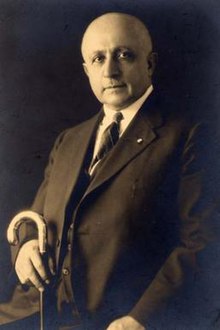Naoum Mokarzel | |
|---|---|
 Naoum Mokarzel | |
| Born | August 2, 1864 Freike, Mount Lebanon Mutasarrifate |
| Died | April 5, 1932 (aged 67) Paris, France |
| Resting place | Freike, Greater Lebanon |
| Occupation | Poet, writer, philosopher |
| Nationality | Lebanese and American |
| Alma mater | Saint Joseph University, Beirut |
| Genre | Poetry, parable, short story |
| Literary movement | Mahjar, New York Pen League |
| Spouses |
|
Naoum Mokarzel (Arabic: نعوم مكرزل / ALA-LC: Naʻūm Mukarzil, sometimes spelled "Naʿum Mukarzil"; 2 August 1864 – 5 April 1932) was an influential intellectual and publisher who immigrated to the United States from the Mount Lebanon Mutasarrifate.
Mokarzel established his first daily publication, Al-ʿAsr (The Epoch) which floundered less than a year after its first issue. He attended medical school for two years before dropping out and became notorious within New York's Arab-speaking community for his aggressive character and controversial demeanor. He engaged in libel and disputes with other immigrants that often became physical and violent. He was arrested on several occasions but was never jailed; his actions stoked politico-sectarian animosity within the Arab-speaking communities of the US.
In 1895 Mokarzel was accused of adultery with a married woman; the two got married and eloped to Philadelphia where, on 22 February 1898, he published the first issue of his second newspaper Al-Hoda (The Guidance). Al-Hoda would grow to become the largest and longest-running Arabic daily newspaper in the United States. In 1902 Mokarzel got divorced, he moved with his brother Salloum back to New York where they set up the newspaper's office. Naoum collaborated with Ameen Rihani who published a regular section in Al-Hoda and he married Rihani's sister, Saada, in 1904. The two men fell out when Mokarzel and Saada divorced and because of political values differences. Mokarzel claimed that his publication was secular but his writings often showed religious bias; he used his publishing house to print and circulate Maronite politics and Lebanese nationalism.
In 1910, Naoum and Salloum adapted the linotype machine to the Arabic script to replace manual typesetting. This contribution paved the way for cheaper and easier publishing for Arabic-speaking communities throughout the world. That same year he married his third wife but he never had children.
Mokarzel was politically engaged and called for the separation of Lebanon from the Ottoman empire. In 1917 he collected more than $30,000 US in donations to relieve the residents of Mount Lebanon during the great famine but he diverted half of the money to fund a volunteer armed force to oust the Ottomans from Lebanon. He represented the Lebanon League of Progress in the post-World War I Paris Peace Conference of 1919 where he advocated for French tutelage over Mount Lebanon; he saw his endeavors materialize in the next few months with the creation of the State of Greater Lebanon. Mokarzel championed freedom of expression, religious tolerance, and women's right for education. He attacked the clergy for sanctioning female illiteracy, and child and forced marriages. He appointed the Lebanese-American journalist Afifa Karam as Director of Women's Issues and had a regular column published about the community's women issues.
Mokarzel died on 5 April 1932 in Paris; his body is interred in his hometown of Freike in Lebanon.
© MMXXIII Rich X Search. We shall prevail. All rights reserved. Rich X Search
